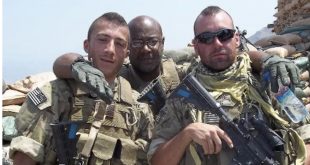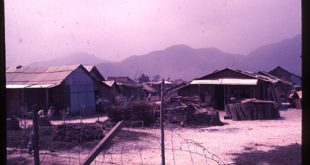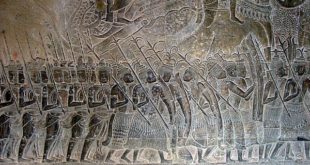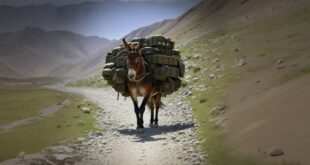Gen Colin Powell has died at 84. Powell had previously been diagnosed with multiple myeloma, a type of blood cancer in plasma cells that suppresses the body’s immune response, CNN reports. Even if fully vaccinated against COVID-19, those who are immunocompromised are at greater risk from the virus. The warped media has disgustingly even politicized this General’s death around Covid and vaccines.
Disregard the hype, he was a man of courage who served and fought many battles, including cancer twice. His life and service are the focus.
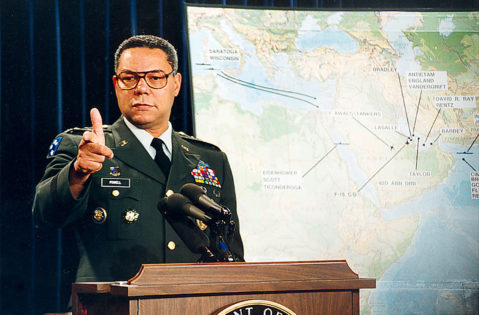
“If a war comes, fight it. Fight it to the death.”
Feature by Air Force Veteran Adam Stump
During Desert Storm, there were many faces of the war. President George H.W. Bush made decisions as the commander in chief and delivered remarks from the White House to the American people on the war’s opening night. Defense Secretary Dick Cheney advised the president on policy. Army Gen. Norman Schwartzkopf led the troops downrange. Serving as the chairman of the Joint Chiefs of Staff, there was an Army Veteran advising Bush and Cheney while working with Schwartzkopf: Gen. Colin Powell.
Powell was less than a year into his tour as chairman of the Joint Chiefs of Staff when Operation Desert Shield started in August 1990. Soon after, he was a key player in a war that the now 83-year-old Veteran fondly recalls during his travels downrange to visit deployed service members.
“These youngsters were great,” the retired general said. “These youngsters were fabulous. These youngsters wanted to do their very, very best. These youngsters trained, like you wouldn’t believe to get ready for this conflict.”Long Description
Army Gen. Colin Powell visits U.S. troops during the war.
‘We’re a family’
Powell said one of his fondest memories of Desert Storm Veterans was watching an Army sergeant talking to a reporter right before the war started. Powell said the reporter approached a tank crew and asked questions to get the soldier to admit fear.
“He said, ‘Well, what do you think? Are you afraid? Are you ready?’ And the young man answered, ‘I’m ready. Sir, we’re trained. We’ve been working hard and I’m ready. We’re ready.’ He said, ‘I’m not afraid. I’m not afraid because I’m with my family. This is my family. We are a family. We will do this well. We will get it done.”
Powell said 30 years later that memory still is crystal clear.
“I’ll never forget that expression of what he said,” Powell said. “His sergeants were smiling behind him. The other soldiers were smiling and that was the attitude that we went into this conflict: we’re a family. And it was not just a family of tankers. It was a family of pilots. It was a family of everybody you can name.”
Before the war ground war started, the Vietnam Veteran traveled to 2nd Brigade, 101stAirborne Division to speak to the soldiers. Powell commanded the brigade back in the 1970s.
“I went and talked to them,” he said. “It was a very moving moment for me.”
Not all moments were serious
He then went to another unit near the Saudi Arabia-Kuwait border. As he walked with troops, he saw camels nearby. He asked if the camels bothered the unit. The NCO he spoke to said the camels realized when a truck pulled up with orange mailbags, they were in for a treat.
“The camels noticed that about once every couple of days a truck would come in, and in the truck, a lot of baggage would be thrown out,” Powell said. “It didn’t take them long to realize that when it’s an orange bag, it’s a mail bag. It didn’t take them long to realize that when you have a mailbag and it’s opened up, it has cookies because the GI’s mother’s sent them cookies.”Long Description
Army Gen. Colin Powell briefs reporters at the Pentagon.
Road to war through a fax
Powell said Bush was cautious not to “go to war just to go to war.”
“President Bush went out of his way to see if he could not find a political solution and not just a conflict,” Powell said.
Despite serving as the senior uniformed military officer, Powell said he was reluctant to place U.S. military lives at stake unless necessary.
“I don’t like war,” he said. “I hate war, but people thought that, you know, I was too reluctant to go to war. Well, I’ll go to war when you want me to, but until we have to, let’s see what we can do to solve the problem.”
His policy to go to war as a last resort led to the media-labeled Powell Doctrine. The doctrine’s principle idea is that, if there isn’t a political solution, then the military should put its full weight behind the war to decisively win.
“That’s what we did in Desert Storm,” he said. “We have to make sure that when we go to war, we go to war for the reason. We have to make sure that we’ve done everything we can to try not to have a war, but if one comes, fight it and fight it to the death. Fight it so they know America cannot be challenged in this way.”
When diplomatic efforts with Iraq failed, then it was time to send in the all-volunteer force. Because of the technology limitations, Desert Storm started over a fax machine.
“Back then, it wasn’t quite the same,” he said. “The way General Schwarzkopf and I talked to each other quietly was with a fax machine. He had one and I had one. Our assistants had access to it and nobody else did.”
Air war softens the battlefield
Powell said one of the major accomplishments of Desert Storm was sending in airpower opening night and for several weeks after.
“We started the conflict with airpower, and airpower did a great job in softening the battlefield,” he said. Before long, he told U.S. commanders to stop hitting targets more than once.
“If the tank engine is cold and it’s not giving off a signal, we killed it yesterday,” he said. “Let’s not do it again. Save the bullets. And we giggled about that, but that’s what we had to do.”
The 100-hour ground war
Powell said the Iraqis were not ready for the U.S. military and more than 30-nation partner coalition. He said the Iraqis put in fire breaks on the border between Kuwait and Iraq. They also dug trenches full of fuel, setting them on fire to stop the opposing force.
The U.S. devised the famed “Left Hook,” which was a main attack to go around the Iraqis. He said the reason was simple: saving lives.
“I don’t want to waste lives, attacking them head on,” Powell said. “It’s not the way to do it. We attack them head, we will lose more people than if we go around.”
Meanwhile, Marines remained offshore, waiting for their opportunity to join the fight. The Marines froze the Iraqis in place. Shortly after the ground war started, Powell received notice the Marines were ready. After watching for weeks, the Marines penetrated through the Iraqi defense, heading toward Kuwait City. Powell said Schwarzkopf ordered Army commanders to move forward. In all, the ground war lasted 100 hours.
“We couldn’t have asked for anything better,” he said. “It was only two days and it was clear that the conflict was going to come to an end.”
Soon after, Powell spoke to Bush and said the ground war would soon end. Powell said rather than wait, Bush ordered the end to the war to stop killing more Iraqis or endangering U.S. service members’ lives.
“The president said, ‘I see no reason to keep killing soldiers, either ours or theirs. Remember, they have mothers and fathers too. And so, let’s bring it to a close,’” Powell said.Long Description
Iraqi troops surrender to U.S. and coalition forces during Desert Storm.
Technology at the forefront
Powell said Americans at the time were in awe of the speed and might of the American military.
“They couldn’t believe that this was that easy,” Powell said. “Well, it wasn’t all that easy, but at the same time, they also saw something they had never imagined.”
Powell said Americans were able to see the war in action because of the constant media coverage. With that, he said Americans also saw U.S. military technology in action.
“I used to kid about it with my audiences,” he said. “Yeah, the Tomahawk missiles would come up the street and wait for a red light to change. Then it would take a right turn and go after the target.”
The former chairman also said other technology such as the M-1 Abrams tank, stealth aircraft and more left a lasting impression on the American public. Another key technology was GPS. At the time, it was a newer concept that commanders wanted to keep in the military’s hands instead of releasing it to the public after the war.
“I said, ‘Guys, let me tell you something. We got to remember the American people gave us this system. Now that they see how it works, they don’t want to find out where somebody’s tank is. They want to know where they are.’”
Powell said Desert Storm provided a technology now frequently used on smart phones and cars across the U.S.
“The beauty of this is we also were able to give to our fellow citizens a great deal of technology that helped.”
Unsung heroes
Powell had high praise for logisticians, Merchant Marines and air transportation. They pushed everything from ammunition to gifts. He said he personally received a call from actor Arnold Schwarzenegger, who wanted to send fitness equipment to deployed troops. Powell turned to the logistics specialists, who made it happen. He said they also played a critical role moving mail to keep troops motivated. Logisticians were also the last to leave once the war was over.
“They had to pack up everything that we’d brought over there and get it all home,” he said. “They did that, and they did it well.”
Powell added that the Defense Logistics Agency quickly developed a system to track cargo flowing in and out of theater.
He said medical teams also were unsung heroes of the war. Although the U.S. had low casualties, the medical teams gave troops, “a sense of confidence that if something happened to them, we’d be there to take care of them.”
All-volunteer force worked
Another part of Desert Storm’s success relied on the first large-scale, all-volunteer force.
“They were wonderful,” he said. “You have to remember, this is the first large military operation we had of this size that was done by an all-volunteer Army. No draftees, all volunteers. But I can tell you this right now, the volunteer Army worked.”
Initial estimates for U.S. casualties ranged from military estimates of 5,000 to others as high as 25,000. In the end, there were only 382 casualties from Desert Shield and Desert Storm.
“As far as Desert Shield and Desert Storm are concerned, it was a great success,” he said. “And I think the American people still feel that way. I certainly feel that way.”Long Description
Army Generals Colin Powell and Norman Schwartzkopf during Desert Storm.
Return home
Upon returning home, Powell said U.S. service members received a well-deserved welcome from the American people.
“They were stunned, not only by the quality of the equipment, they were stunned by the troops,” he said. “They fell in love with this all-volunteer Army like you wouldn’t believe.”
He said commanders initially wanted troops to return home to start their normal recovery cycles. However, the popularity of the American service members’ performance changed those plans. He told his commanders to let U.S. troops enjoy American’s appreciation.
“You keep giving the American people all the parades they want to see,” Powell said. “We haven’t had this in a long time. We’re going to keep with the parades. We’ll catch up with the training later.”
When a New York City group organized a parade, the Bronx-raised Powell said he asked Bush if he wanted to participate. He said the president declined, saying “I’m not coming. This is about you guys.” The president later did attend a parade in Washington, but as a spectator, applauding the troops.
“This is the kind of class that I think our armed forces showed under the leadership of President Bush that people were not expecting,” Powell said.
Unfounded criticism
Powell said that, despite Desert Storm’s overwhelming success, some people still criticized the operation because they thought the U.S. should have continued to fight into Iraq.
“I had to spend a lot of time in my future years telling people why we didn’t continue fighting,” he said. “We did what we were supposed to do. We freed Kuwait.”
The retired general said the war eventually led to another outcome. Because the U.S. showed restraint and allowed the Iraqi army to return home, they had enough strength to fend off any attacks from neighboring Iran. That decision, he said, eventually helped Iraq become independent.
“The Iraqis now have full, complete control of their own government, their own people.”
Caring for Veterans
Powell praised VA’s work taking care of Desert Storm Veterans following the conflict. He took his Russian counterpart at the time, Gen. Mikhail A. Moiseyev, to VA to show him how the U.S. takes care of service members who have been injured. They also viewed how VA creates prostheses for Veterans in need. By the end of the visit, the Russian general told him, “We got to do more of this.”
Powell believes it’s important – in both times of war and peace – to take care of Veterans and their needs.
“I am a Veteran,” Powell said. “I take advantage of the opportunities that I have. I will never forget what VA has done for me over these years, many, many years, more importantly, what VA has done for all of our American Veterans who were there and who deserve everything that we can give to them from VA.”
Legacy
Powell said the anniversary is an opportunity for all Americans to appreciate the work Desert Storm Veterans did in service of the country.
“I think the 30th anniversary of Desert Storm is a good time to sit back, think about it, reflect on what we did in a short period of time, how we responded politically to what was going on and how we put together a great force, a force of 30 nations that came together as a coalition,” he said.
Powell added Desert Storm Veterans deserve recognition and respect for earning a hard-earned title—Veteran.
“Let’s all come together and pay tribute to what our troops did for Desert Storm,” Powell said. “Let’s remember where they are now and who they are now. They’re all Veterans. I’m a Veteran. I’m proud to be a Veteran. I’m as proud of that title as any other title I’ve ever had.”
Author Adam Stump is a public affairs specialist with VA’s Digital Media Engagement team. He is a retired Air Force Veteran who served 20 years, including two deployments to Afghanistan for detention operations and special operations.
 Soldier of Fortune Magazine The Journal of Professional Adventurers
Soldier of Fortune Magazine The Journal of Professional Adventurers


